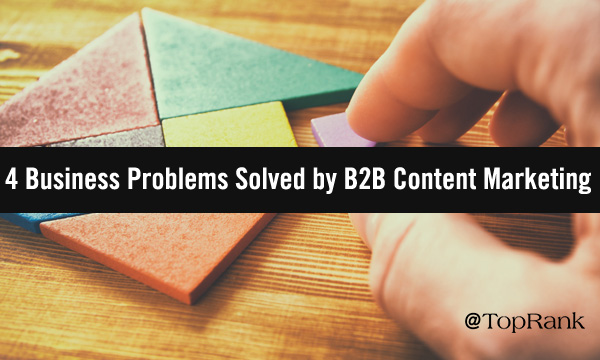
For B2B business, the pandemic was a magnifying glass pointing out the cracks in systems. We discovered just how fast digital transformation can be when our livelihoods are on the line. We found that global supply chains aren’t as resilient as we thought. We found that remote work is far more viable an option than we’d been led to believe.
None of these realizations were brand new — we were just able to see them clearly for the first time.
The same is true of B2B buyer behavior. When we talk about how the pandemic changed B2B sales and marketing, what we mean is that we can finally see what we have missed before.
As we rebuild what’s broken and seek to evolve to the next level, we have a chance to put the buyer at the center of our efforts. Here are some of the biggest challenges ahead, and how we can meet them.
Solving B2B Business Problems with Content Marketing
1 — Communicating Empathy
You don’t get through collective trauma like we’ve all experienced for the past two years without a few scars. People are still adjusting, processing, struggling, even grieving. At the same time, businesses have needs that your solution can meet, problems you can solve. But how can brands help without seeming insensitive?
Content marketing is our most powerful tool for communicating human-to-human, offering actual value. Now is not the time for bland corporate-speak, either — showcase your people in your content, along with others in your industry who have earned respect and trust.
Be helpful and kind in your content. Be a caring companion to your audience. After all, marketers are the keepers of data — we know these people and what they’re struggling with. We’re in a unique position to create uplifting content.
“Be a caring companion to your audience. After all, marketers are the keepers of data — we know these people and what they’re struggling with. We’re in a unique position to create uplifting content.” — Joshua Nite @NiteWrites Share on X2 — Leading with Purpose
Lately, businesses have come to the groundbreaking realization that people care deeply about social issues. This is a discovery on par with the earth-shattering epiphany that B2B buyers are human beings who need emotional appeal as well as facts.
This epiphany has led to serious discussions about “purpose.” What does your brand stand for besides shareholder profit? What issues are top of mind and how is the brand helping address them? How can we let people know that we share their values?
Content is key for a brand that’s looking to lead with purpose. It’s the medium to tell the brand’s purpose story, of course. But we can go deeper: Content can be a way to amplify other voices and help tell their stories.
A brand can post a Martin Luther King, Jr. day message, complete with one of his safer quotes. But a content marketer can publish a blog post from a leading voice in the Black community. A brand can say they stand with Ukraine. A content marketer can bring refugee voices directly to a sympathetic audience. That’s leading with purpose, not purpose as an afterthought.
3 — Humanizing the Brand
I’ve written before about humanizing B2B marketing — specifically about how easy it is to overthink the whole thing. What’s the line between relatable and unprofessional? Will we lose trust in our competency if our content is too lighthearted? How do we relate to our entire audience without alienating a segment?
Here’s the thing: You can’t humanize a brand.
I say again: You CAN’T humanize a BRAND.

The exception that proves the rule.
Brands are not humans. People are. Content marketing can feature people on behalf of the brand, rather than attempting to speak for the brand.
Bring your executives into your content. Bring employees, influencers, external experts. Bring — I’m begging you — your customers and prospects in as well.
If you want to truly humanize, let the humans come out from behind the brand. Content marketers can lead the way.
4 — Building Relationships
I have talked more about building relationships in a decade of being a marketer than I did in a decade of being single. But in the world post-pandemic (and our current world of ongoing but milder pandemic), relationship-building is an even more crucial part of success for B2B business. Repeat customers, referrals and brand advocacy are all a more reliable source of revenue than even the most targeted advertising.
Content marketing can help build these relationships. The first three points I made are all about laying the groundwork for a relationship. Content can offer helpful advice, information about the state of the industry, best practices — in other words, what your audience needs to succeed in their professional and even personal lives.
The quickest way to build a relationship? Give your potential customer that crucial bit of advice to make them look brilliant in front of their boss. Give your existing customers recognition and highlight the awesome success your brand helped them achieve. The more you lift up and celebrate your buyers, the more they are likely to do the same for your brand.
“Content can offer helpful advice, information about the state of the industry, best practices — in other words, what your audience needs to succeed in their professional and even personal lives.” — Joshua Nite @NiteWrites Share on XElevate Your Content to Solve B2B Challenges
It’s been a rough couple of years. Human beings have experienced individual and collective trauma, and we’re still processing and rebuilding. That’s true both of the marketers creating content and the people consuming it.
The way forward is to use content for what it’s really good at: Telling stories, amplifying human voices, and providing value. That’s not to say content should be doing all of the above instead of driving a business outcome — I’m saying that helpful, human content is the way to drive a business outcome.
We have the privilege, as content marketers, to create something that serves both the brand and the audience, and might even be fun for us to create. It’s a unique opportunity and one we should all embrace.
Check out our Content Marketing service page for more inspiration.



